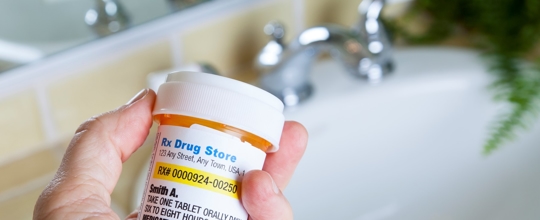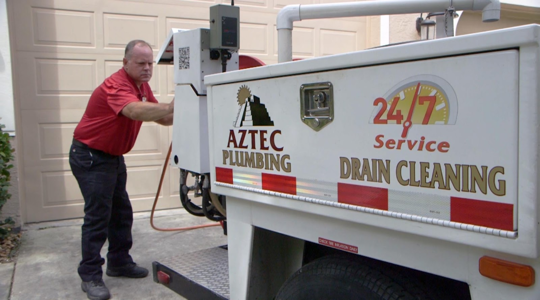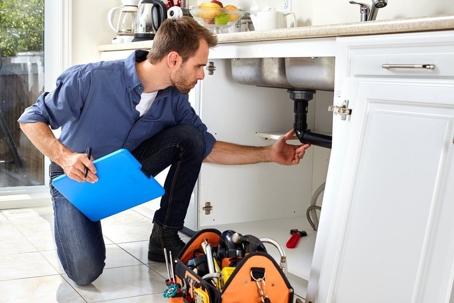
While drains make for convenient disposal, some things should never go down them. Wastewater treatment plants can remove a variety of pollutants, but certain contaminants can slip past the treatment facility and harm our waters and living resources. Some chemicals can kill microorganisms and corrosive materials can deteriorate pipes and require professional drain cleaning to fix.
Here are four common household products that should be disposed of properly.
Paint Thinners
Paint thinners are extremely corrosive and loaded with chemicals and have absolutely no business in your plumbing system or in storm drains. Take used paint thinner to a hazardous waste disposal site. Even better: recycle it. Save used paint thinner in a jar, allowing the bits of paint and other bits to sink to the bottom. Then pour the clear thinner into a second jar and reseal it for later.
Motor Oil
Never, ever pour motor oil down your sink or storm drains. Used motor oil should be kept in an air-tight container. Many auto parts offer a recycling program. Like many other lubricants, motor oil can be harmful to the environment. Not only can motor oil contaminate the soil, but it can also leach into groundwater. Furthermore, you’ll be at a greater risk of experiencing a sewer backup. Because motor oil is not water-soluble, it tends to stick to the walls of your pipes.
Medications
Flushed medications end up at a wastewater treatment plant. Unfortunately, these facilities have trouble removing man-made chemicals from the water supply. If the medications are released back into local rivers and lakes, there’s a good chance marine life can be harmed. When exposed to certain medications, studies have shown that fish can experience poor growth and development. Throw them in the trash instead.
Pesticides
Once pesticides exit your sewer line, local ecosystems are immediately put at risk. If your home has an underground septic tank, the pesticides can harm the system by destroying good bacteria. You may need to replace your septic tank much sooner than expected. Your best option is to take leftover pesticides to a hazardous-waste collection site.
Bottom line: This is by no means a complete list of drain no-gos. Basically, if it’s hazardous, don’t wash it down your sink or flush it. This includes corrosive chemical drain cleaners, which don’t do your plumbing system any favors. If you run into any plumbing complications, depend on Aztec Plumbing & Drains at (239) 932-2959.
Learn More in Our Drain Cleaning Series:

When one of your pipes clog, you need a fast solution. There are several popular methods to unclogging a drain or toilet, but the most effective one depends on the depth of the clog. Sometimes, the cause of a blockage spans much deeper than the drain itself; because all of your home's drain pipes connect into a mainline, a problem with one pipe can easily affect other drains in the house.
When a clog has run deep into your home's plumbing, a professional hydro-jetting service is an easy, safe and non-invasive way to dislodge it.
Hydro-jetting vs. Snaking
A tool called an auger is used to "snake" a drain; snaking is one of the oldest and most trusted methods of unclogging toilets and pipes. Because it is controlled by the plumber's precision, snaking is good for delicate pipes and prevents any damage during the service job.
Hydro-jetting is far more powerful than snaking, capable of both dislodging a clog and flushing a pipe from other debris that's built up around its walls. Different levels of water pressure can be used to clean pipes, including high-level hydro-jetting that can clean a home's main sewer line.
When to Use a Plunger
A handy tool, the reliable home plunger can quickly resolve a blocked toilet or sink. However, plungers are only suitable for shallow clogs. If your pipes are being affected by a clog in a drain line or even your main sewer line, then you'll need a more powerful approach.
Making the Right Call
Hydro-jetting is a versatile and effective solution, but it may not be suitable for homes with older plumbing as high water pressure can lead to bursts. Snaking is the go-to method for professionally unclogging drains, and a plunger is an excellent DIY resource to always have nearby.
Plungers will be able to resolve most clogged toilets without a problem, but if you find that all of your home's drains are affected even without evident clogging, then a professional from Aztec Plumbing & Drains can help.
Contact us today to schedule your next service call with one of our qualified Fort Myers plumbers!
Learn More in Our Drain Cleaning Series:
What Causes A Drain Pipe To Leak?
A leaky drain. Few things are more annoying and perplexing. You take care of your plumbing. You don't do anything crazy in the kitchen. What gives? Truthfully, drain pipes can leak for a lot of reasons, and they may not have anything to do with poor maintenance. Here are some of the things our leak protection specialists see most often.
Loose Compression Nut
The compression nut creates a watertight connection between two pipes. When it's loose, you'll experience leaks that can be big or small depending on how loose the nut is and the intensity of the flow.
Luckily, this is one of the easiest drain pipe repairs that can be done in just a few minutes.
Worn Compression Nut
Maybe your sink is getting on in years, or general wear-and-tear has worn out your sink's compression nut. If that's the case, you'll experience leaking until it is replaced. Fear not; this is both inexpensive and an easy repair job. You'll have your sink back up and working like new in no time.
Ill-Fitted Pipes
If you've had a new kitchen sink installed recently, it's possible that the pipes aren't the right length. If pipes are too long or too short, you're prone to leaks and even spontaneous bursts. Ill-fitted drain pipes create pressure, which can cause leakage and water damage if left untreated.
The best thing to do in this scenario is to contact a professional plumber and have them evaluate your sink's plumbing structure.
Pipes Need Replaced
There are several main players in your kitchen's drain system. First, the tailpipe. Then, you'll notice a J-shaped pipe that is called the P-trap. This pipe is connected to another, which users water out of your sink and into your home's main waste line.
If any of these pipes are damaged, then you're prone to leaks even if you replace the compression nut. Leaks tend to worsen over time, and pipes can become eroded for a number of reasons. It could be old age, but there could also be clogs or internal erosion that's causing water to escape.
Replacement costs vary depending on what needs to be swapped out. In some cases, it's better to replace the entire structure to prevent leaks from spreading.
Water Pressure
Your home's water pressure may be too high for your sink, which causes leaking even if there's nothing wrong with the pipes or seals. High water pressure can lead to a variety of problems, even though you may not even think it's too forceful.
The best water pressure for a house is between 40 to 45 psi, though some pressure regulators are set at 50. In some homes, they may even be 60 or 70. You can assess the water pressure in your house by applying an inexpensive pressure gauge to your main water supply.
Adjustments are easy, but if you aren't sure where your supply is or how to change it, a plumber can show you exactly what to do and how to make any modifications in the future.
Patching the Leak
Although you'll want to call in a professional to get to the root of the problem, you can work around the leak in the meantime. Apply some epoxy putty to the leak to create a temporary seal; just make sure you have the water shut off and nothing is left in the pipe first.
You could also use some repair tape to create a seal around the leaky pipe before help arrives. This is far from a permanent solution, but it can prevent water damage. You should also place some towels under the leaky pipe, and if dripping persists, use a bucket to catch the water.
Leak Detection & Repairs in Fort Myers
If you need a plumber in Fort Myers, don't wait another day. Contact us at Aztec Plumbing & Drains for unmatched 24-hour care and repairs!
Learn More in Our Drain Cleaning Series:
Everyone knows the distinct, rancid smell of rotting eggs. The sulfur-like odor is unmistakable, and it seems to completely fill up the area it’s in quickly. So when your nose catches a whiff of it in your own home, you more than likely want to track it down and get rid of it as soon as possible. If the culprit isn’t simply sitting in your trash can, then there’s a good chance you’ll follow your nose to your drain. Does it need expert drain cleaning services or can you fix it on your own?
Why Do Drains Smell Like Rotten Eggs?
There are actually several different causes for your drain smelling like rotten eggs, but they all come back to one primary reason: gas from your sewer line is coming back up your drain system and escaping into your home through the drain itself. Here are a few common ways this happens.
You Don’t Have a Proper Drain Trap
A trap is a u-shaped bend in your drain line, usually just below your drain itself, that fills up with water which forms a sort of natural seal over your drain. Things that go down your drain can easily navigate through your trap, but a small amount of water will remain in the trap itself. This water blocks gas and air from your sewer line from finding its way back up your drain pipes and out through your drain.
If you recently had a drain replaced or repaired, and your plumber didn’t install a proper trap in the line, then there’s a good chance there’s no water blocking the line and preventing gas from getting through. Having a plumber install a correct trap should fix the issue.
You Haven’t Used Your Drain in a While
It’s pretty easy to see a flaw with drain traps as a technology: they depend on water, and water evaporates. If you haven’t used a drain in some time, the water may evaporate down to the point where there isn’t enough in the trap to seal off the gas. Simply run your water for a minute or so and this should solve the problem.
Food Is Stuck In the Drain
One of the reasons this rotting smell can happen in kitchen drains, even when they’re working properly, is from rotting food getting stuck on the walls of your drain line, even before the plumbing trap. When this food starts to decompose, it starts to smell, and may smell like rotten eggs or even mold.
There’s a fairly easy natural way to resolve this. Boil several cups of water on your stove and keep it scalding hot. When the water is just about ready, pour a couple of teaspoons of baking soda down the drain, and then quickly follow it with some vinegar. Then follow the mixture by pouring the boiling-hot water down the drain (be careful not to burn yourself). The foaming mixture should eat away the junk in your drain and eliminate the smell. Then follow it up by tossing a few chunks of lemon down the drain and turn on your garbage disposal for a lemony-fresh finish! This also helps to clean out your garbage disposal, which may also have traces of rotting food stuck inside.
Clogged Plumbing Vent
A clogged plumbing vent is perhaps the least common reason for a smelly drain, but can often happen when something like leaves, dirt, or even a small animal become lodged in the vent pipe that’s sticking out of your roof. Your vent pipe is what allows water to flow seamlessly down your drain and sewer lines, so it’s important to keep these clear. There’s a very distinct sign that your drain line might be clogged aside from the smell as well: a gurgling sound in your drains as the water flows away. If you hear this sound and smell rotting eggs, call a plumber right away!
Trust the Fort Myers drain cleaning and clog removal team from Aztec Plumbing & Drains to get the job done right. Give us a call at (239) 932-2959 today to request more info.
Learn More in Our Drain Cleaning Series:

Drain Cleaner Products Explained
If you’ve been to a hardware or home improvement store and browsed the plumbing section, you’ve probably seen a healthy selection of drain cleaner products that claim they can tackle even the toughest clogs and get your drains flowing free and clear again at a much lower cost than having a professional tackle the issue for you. But is the savings really worth it or is drain cleaner dangerous? If you knew what those drain cleaners do to your home, you’d probably think otherwise.
What Do What Drain Cleaners Do?
Chemical drain cleaners are often substances with extremely strong dissolving capabilities. This gives them the ability to eat away through all sorts of different substances that may have caused a clog, including both organic and inorganic material.
While this may seem like a good idea, what many people don’t realize is that most of the time they simply wear a small hole in the clog because they can only cover a small portion of the pipe. They never get rid of the entire clog. What’s worse is that drain cleaners can eat away nearly anything, and that includes the walls of the pipe itself.
Drain cleaners have been known to dissolve pipes of all types, including:
- Iron
- Copper
- Steel
- And PVC plastic
So while you might at least clear enough of a hole for your drain to work again, you could be doing serious long-term damage to your plumbing that may require extensive repairs later.
What About Bacteria Cleaners?
Bacteria cleaners are a new and popular drain cleaning solution, and there is some merit to them. These cleaners use a form of bacteria that are harmless to humans and pets and your plumbing but eat away at organic material that forms in your plumbing and causes clogs.
This can result in a much better result than a traditional drain cleaner chemical, provided your clog is organic in nature. If it’s not, then these solutions won’t help you and you’ll need to reach out to a professional for a better solution.
Why Choose a Fort Myers Plumber?
Having a plumber sort out your clog issue is a much more reliable method of getting rid of the problem completely and reducing its chances of ever returning. Plumbers use specialized tools and well-practiced techniques to completely clean the inside of your pipes and remove all traces of the clog that was slowing down your drains.
These tools also don’t do any damage to the inside of your pipes, so you don’t have to worry about the de-clogging process doing any extra damage to your pipes that you’ll have to fix again later. When you think about it, even though it might be the more expensive option up front, you’re actually saving yourself money in the long run by preventing further issues from emerging.
Contact Aztec Plumbing & Drains online to schedule your drain cleaning appointment now!
Learn More in Our Drain Cleaning Series:
Have you ever taken a shower and noticed water sitting at your feet? Or you are doing dishes in the kitchen sink and notice the water is not draining properly? Well, this may be a sign that you have a clog in your pipes! Now sometimes a clog is not a big deal at all and can be fixed with a simple solution. Other times, the clog can be a warning sign for a much bigger problem and requires professional drain cleaning. It is smart to test out all options before jumping to the worst conclusion, which can save you peace of mind and money! Here are a few tips & tricks to help with your clogged drain!
Boiling Water
- Fill a tea kettle and heat the water to boiling
- Pour the water slowly down the drain in several stages, waiting between pours to let the hot water work its way through the clog
- Repeat until the drain is flowing again
If you are experiencing a clogged drain, an easy first step to try and unclog the drain is to pour boiling water down the drain in intervals. If you pour the water down all at once the boiling water may overwhelm the drain not allowing it to work. The boiling water can break down particles in the drain that may be blocking the water flow. If this method does not work, then you may need something stronger to break down the clog.
Baking Soda and Vinegar
- Mix ⅓ cup of vinegar and ⅓ cup of baking soda
- The reaction is immediate so pour it down the drain quickly
- Wait an hour and flush with hot water
Baking soda and vinegar can help break down particles that boiling water can not. This trick is a step up from boiling water but will only really work on a blockage that isn’t 100%. There are different ways you can do this step but the most effective way is to pour baking soda down the clogged drain, about ½ cup, and let sit. Meanwhile, boil water and put about a cup of vinegar into the water. Pour water and vinegar down affected drain and let sit for about 30 minutes. Once time is up run water down the drain and see if the blockage has cleared. If not, you may have to manually remove debris.
Snake the Drain
- Unwind the cable to feed it down the drain until you feel butt up against an obstruction
- Gently move the head around until it snags the clump and carefully reel it back up
If the drain is still persistent on not being cleared, your next move should be to try to clear the drain by hand. If you do not have the proper equipment to snake a drain, you can use a wire hanger as well. This can get messy, so you may want to keep a towel nearby. Sometimes all you need to do is clear the drain by hand and physically get the debris out. If you clear the drain and the problem is still persistent you may need to call a professional.
Use a Coat Hanger
- Straighten out a wire coat hanger
- Bend one end to make a small hook
- Guide it through the drain cover
If the clog is closer to the drain opening, you may be able to work it loose with a coat hanger. Work the wire hanger around until you feel it take hold of something, then gently bring it back up. You’ll likely have a glob of hair dangling from the end.
If the drain is not easily cleared by these 4 simple tips, you may have a more serious underlying issue. Call a plumbing professional, like Aztec Plumbing & Drains, who can properly assess your situation and fix your home right away! Aztec Plumbing, we have you covered from A to Z!
Learn More in Our Drain Cleaning Series:







